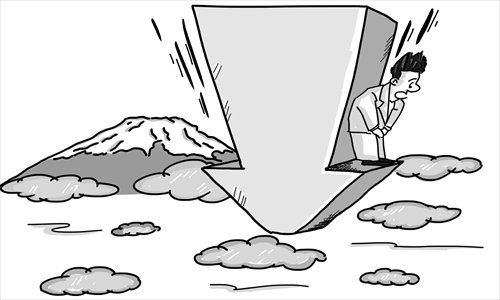Japanese economic decline defies solution

Illustration: Chen Xia/GT
What on earth is the matter with the Japanese economy?
I spent 16 years as a business reporter in Tokyo when the Japanese seemed to have the Midas touch in their trade and industrial development. Respected American pundits painted a picture of "Japan as No. 1," and I even wrote a book about how Japanese business ideas were revitalizing British industry. Just as with China today, many Westerners fretted over rich Japan gaining ownership of their iconic corporate brands.
Now, it's all bad news, typified by last week's announcement of a trade deficit for the 15th straight month in September. Wherever one looks, there is weakness defying every effort at solution.
In recent months, a number of aggressive policy measures sought to revive the moribund economy, but the only effect was to cut the yen's value against the US dollar by around a quarter. Devaluation, of course, is good news for exporters; however, it makes imports more expensive and that is what led to the trade deficit.
Japan's import bill has soared due to purchasing large amounts of fossil fuels (it has coal but virtually nothing else) to feed the country's energy needs, caused by the shutdown of the nuclear power industry following the disastrous April 2011 Fukushima earthquake.
Nuclear power once supplied a third of the power needs, but the Japanese public seems highly allergic to any return to that energy source. So, for the past year, imports have exceeded exports and it's likely this pattern will continue.
However, Japan's problems are far more deep seated than this, with the seeds sown more than two decades ago. For one thing, the famed Japanese work ethic has noticeably declined among the younger generation.
Japanese products that once dominated world markets are no longer in demand. The huge trade surpluses of the 1970s and 1980s were based on a flood of innovative, price-competitive electronic products and automobiles that foreign consumers loved. Now, China has assumed the mantle of supplying the world with the electronic products it needs, and automobiles may follow.
Sony, once the model of success with a stream of iconic products like the "Walkman" as well as computer games consoles, has long been struggling to overcome mounting debts. Two giant automakers, Toyota and Honda, report heavy losses, partly due to a decline of traditionally strong markets such as Indonesia and Thailand.
Despite some evidence of an economic upturn this year, Japan faces one inherent weakness in trying to compete with its powerful neighbor, China, and this involves domestic demand.
The fact is that Japan's population is both shrinking and ageing. The birth rate is extremely low by world standards - not even achieving a replacement rate. The population is now about 127 million, of which 38 percent are aged 55 or older, and 24 percent are over 65.
When China's exports suffered shrinkage in recent times, the government was able to offset this by successfully tapping the underdeveloped domestic market. Japan doesn't have the same leeway.
The Japanese themselves don't seem to be able to find any answers to the economic ills evident for a number of years. Looking at local analyses, one finds a constant refrain of a weak, over regulated financial market with a lack of competition, and high labor costs that have forced many of the biggest companies to shift their production overseas. This tends to weaken the domestic job market and curb demand (the Japanese have always been big savers cautious about overspending).
To stimulate demand, of course, the Bank of Japan might increase money supply and the government might spend more. Credit is tight, but there is great reluctance to loosen it for historical reasons - the scars left by the collapse of the housing market in 1990.
Ready availability of credit created a "bubble economy." Thus, housing prices kept rising at an unhealthy rate (as is now happening in China's big cities). Logic played no part; people forgot that what goes up can also come down.
I was personally involved in that. In the early 1980s, I bought a house near Tokyo financed by a heavy mortgage. In 1989, however, I got nervous and sold out at a big profit just before the market crashed. The less fortunate found themselves with property worth less than the loan repayments; banks suffered heavily and at least two collapsed, leaving scars that remain in the Japanese psyche to this day.
Thus, it seems there are no easy solutions available for Prime Minister Shinzo Abe.
The author is a lecturer at China Foreign Affairs University. bizopinion@globaltimes.com.cn